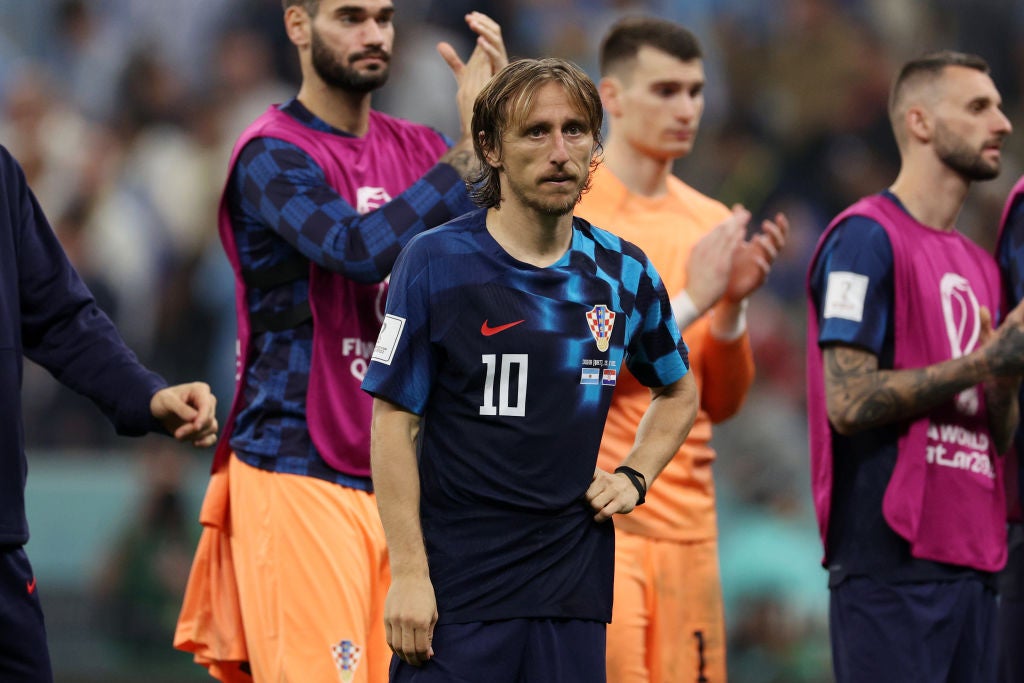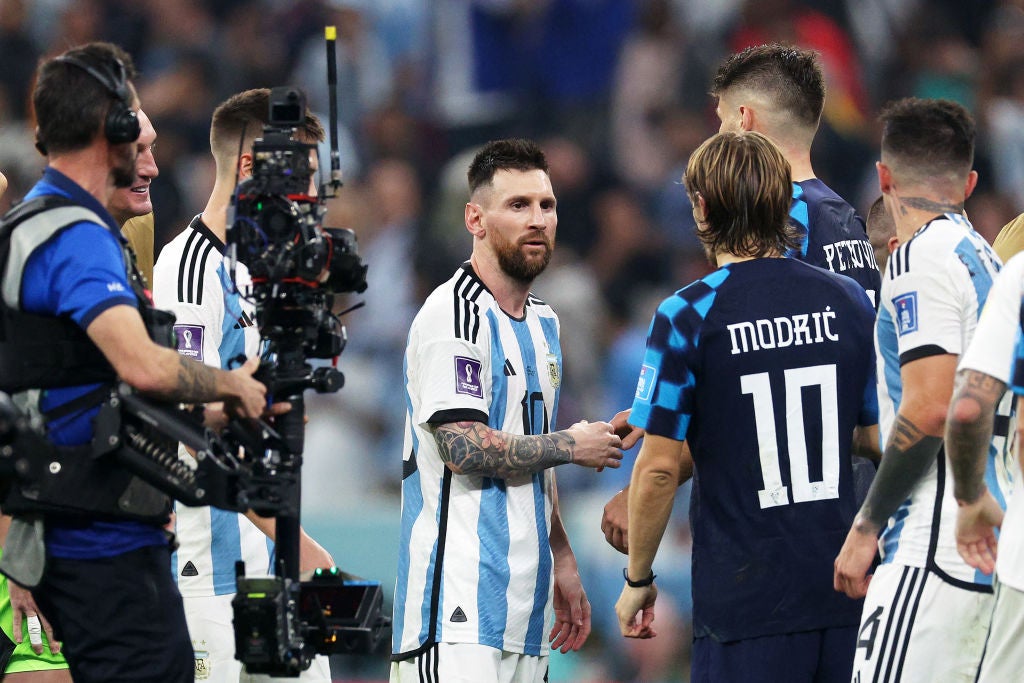
His final contribution brought the ultimate indignity. The byword for precision was smacked in the face by his own shot. Admittedly, it ricocheted back off Alexis Mac Allister and there was little Luka Modric could do about it. The winner of the Golden Ball in the last World Cup nevertheless ended up with the ball in his face in this.
And that, bar a third-place play-off, was Modric’s final involvement on this stage. His number went up seconds after; in effect, the white flag had been raised with it. When the captain came off, it was all over for Croatia. They were 3-0 down. He had wrested back control of one World Cup semi-final, his every pass asserting control with a trademark blend of elegance and intelligence, but that was four years ago against England. There was no repeat. Modric can feel timeless, but his time is up in World Cups.
They all knew it, the Argentina fans who joined in the ovation when Lovro Majer replaced him, his former Real Madrid teammate Angel Di Maria, who sought him out after the final whistle, the now retired Sergio Aguero who came to offer his condolences in the tunnel. Argentina had been graceless winners against the Netherlands in the quarter-final; when it came to Modric, however, they recognised greatness. Perhaps it was the parallel with Lionel Messi, with the other old-timer in his final World Cup; flip the result and others would have commiserated with him. One way or another, sadness was a certainty.

They have been named the best players in the last two World Cups respectively. In a quiet first half-hour, when Croatia had the majority of possession and Argentina demonstrated scant threat, there was a chance Modric would retain his title. Then Messi and Julian Alvarez intervened. The notion that Modric might plot a path into a second World Cup final receded.
Argentina had long tried to make it an obstacle course. “They had four midfielders and closed the middle,” Zlatko Dalic noted: that quartet are all central midfielders by trade, all with the energy and discipline to apply themselves to their defensive duties. If it is too simplistic to say they were selected to stop Modric, not least because the excellent Enzo Fernandez and Rodrigo de Paul would have played anyway, it was their primary task. For Argentina, control came from crowding players around Modric: it was not enough to stop him getting the ball, as a total of 93 touches indicated, but to prevent him from exerting a decisive impact with it.
Dalic has argued Croatia have the World Cup’s best midfield. Modric, Mateo Kovacic and Marcelo Brozovic play the game at their own pace and rhythm, these like-minded souls who see passing as a panacea. But when Brozovic went off in the 50th minute, Croatia were playing 4-2-4 with Ivan Perisic as a particularly attacking left-back. They were looking more stretched and less composed than usual. Dalic had thrown on his penalty shootout all-stars but the chances of a third successive shootout were disappearing. When Modric went off for Lovro Majer, Croatia’s second, and greatest, golden generation were bowing out.
“Perhaps this is the end of the generation at World Cups, a couple of them have reached an age,” Dalic said. Or an end, if not the end. “It is an excellent generation that two times in a row reached the semi-final. I believe a lot of players will finish their career in Euro 2024.”
Modric is the greatest and oldest of the generation; 37 now, he will be pushing 39 in Euro 2024 and yet, some 161 caps into his time with Croatia, the hints are that he will play on until then. It is all the more admirable as, by and large, Qatar has been no country for old men in the last month: not for Cristiano Ronaldo or Luis Suarez or Eden Hazard or Thomas Muller or Aaron Ramsey.

There have been a few exceptions to the rule: Messi, Modric and, with fewer Ballons d’Or than either, Olivier Giroud. In two cases, it is a triumph of technical skills. They have never deserted Modric and perhaps never will. The remarkable part of his staying power, however, was his running power. He ran back the length of the pitch to make a vital defensive header in his own box as he became the first 37-year-old outfield player since Nilton Santos in 1962 to start six World Cup games. After playing 99 minutes against Japan, he completed 120 against Brazil. There were 80 on the clock when he was withdrawn against Argentina.
He lingered on the pitch after the final whistle, watching the Argentinians bounce up and down in celebration at reaching a World Cup final. Four years ago, that was them. For Messi at the Lusail, read Modric in Moscow. Five days earlier, he had helped eliminate the other South American superpower, denying the world the Brazil-Argentina semi-final that had seemed destined. That was his last masterpiece in a World Cup. It is a result that may seem still stranger in future years, if a small country’s stream of talent slows to a trickle, if it does not produce another Modric. But one Modric brought two semi-finals, even if the first ended with the ecstasy and the second with the ignominy.







